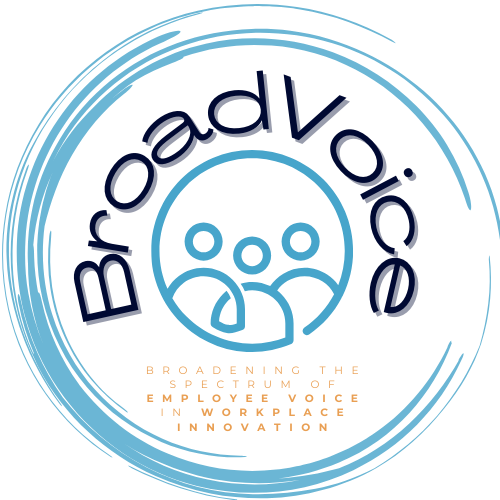
About BroadVoice
‘Employee voice’ is increasingly recognised as a driver not just for enhanced organisational performance but for workers’ health and wellbeing. In recent decades the growth of workplace practices such as self-organised teamworking and employee-driven innovation has made a positive impact on businesses and working lives.
The key concept here is workplace innovation, adopted by the European Commission in 2012. It describes a participatory process of organisational transformation leading to greater worker autonomy, enhanced learning and development, and high-involvement improvement and innovation. Evidence shows that workplace innovation leads to significant and sustainable improvements in both organisational performance and employee engagement and well-being.
More recently, the European Commission, along with many experts, has emphasised the need for ‘human centric’ workplaces to play a leading role in the ‘twin transitions’ towards digitalisation and environmental sustainability – a transformation conceptualised in policy terms as ‘Industry 5.0’. In short, these transitions are unlikely to be effective without harnessing and developing employee skills, tacit knowledge and innate creativity.
But, as recent surveys remind us, only a minority of European businesses are adopting these empowering practices systematically, and there is still a ‘long tail’ of companies and public sector organisation locked into traditional ‘command and control’ ways of working – with adverse economic, social, health and environmental consequences.
So what does this mean for the role of trade unionists and worker representatives? Is representative participation in the form of collective bargaining, co-determination and worker representation now in competition with workplace innovation? Or does workplace innovation open new arenas for engagement and influence by trade unions and worker representatives?
We continue to lack in-depth analysis of the interaction between the forms of direct employee participation represented by workplace innovation and the traditional industrial relations framework of trade unions, worker representation, collective bargaining and social dialogue. By bringing research institutes with experience in industrial relations and work organisation from 6 EU countries together with 14 national and EU-level social partners, BroadVoice is investigating – and thus helping to foster – the role of trade unions and worker representatives as knowledgeable participants in workplace innovation, bringing the rich experience and insights of workers to the search for win-win outcomes that simultaneously improve working lives and performance. Likewise BroadVoice is exploring the ways in which collective bargaining and representative structures can become the drivers and guardians of workplace innovation at enterprise level.
FURTHER READING
ONLINE
EUWIN (the European Workplace Innovation Network)
European Journal of Workplace Innovation (Article)
Industry 5.0 (European Commission)
European Company Survey 2019 (Eurofound/CEDEFOP)
Trade unions’ responses to Industry 4.0 (Article)
Bridges 5.0 (EU Horizon project)
Becton Dickinson, Ireland (Case study and video of union-led workplace innovation)
PUBLICATIONS
Abrahamsson, K. and Ennals, R. (2022) Sustainable Work in Europe: Concepts, Conditions, Challenges. Berlin: Peter Lang.
McMurray, A., Muenjohn, N. and Weerakoon, C. (Eds). (2021) The Palgrave Handbook of Workplace Innovation across Developed and Developing Countries. Cham: Palgrave McMillan.
Oeij, P., Rus, D., Pot, F. (2017) Workplace Innovation: Theory, Research and Practice. Heidelberg: Springer.
| Home| About | Consortium | Contact |
BroadVoice investigates and fosters the role of trade unions and worker representatives in stimulating, informing and sustaining workplace innovation, leading to positive outcomes for employees and businesses alike.
